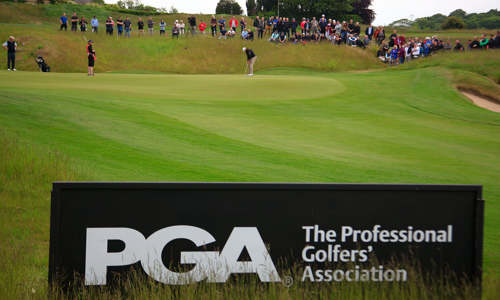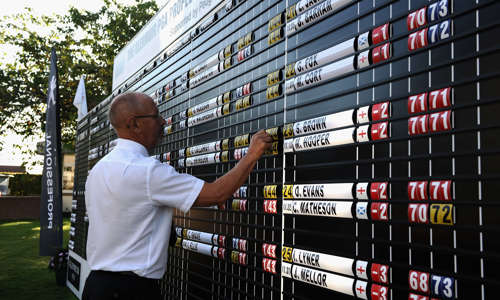Derek Nash - A life well-lived

06/11/2020
The PGA is saddened to report that Derek Nash, a Life Member and former chairman whose career embraced cleaning innumerable sets of clubs on a Monday morning, playing alongside Jack Nicklaus in The Open and guiding the Association through a turbulent period, has passed away at the age of 87 following a short illness.
“His was a life well lived,” said Alan Walker, a Master Professional and former PGA Captain, paying tribute to Derek, who was chairman from 1985 until 1988.
Peter Alliss, whose second spell as PGA Captain occurred during Derek’s time as chairman, and Dr Phil Weaver, OBE, his successor in the role, also paid fulsome tribute.
“He was a great supporter of golf, an enthusiast and a good pro,” said the former. “He was a really good professional for our business.
“He was quiet, very reliable and very sensible. Today, people would say he was old-fashioned but he was a man for his time.
“He fitted in and worked very hard for the Association. He cared about it. He cared about the people, the game and those who played it. He was a really tip-top professional – of the old school.”
All those qualities, and more, were in evidence when Derek succeeded Ronnie Alexander as chairman at a time when the manner in which the Association was managed was destined for seismic change.
“He took over as chairman when the Association was at a crossroads,” explained Dr Weaver.
“The old regime of huge general committees was about to become a slimmed-down one.
“When Derek became chairman, there was basically just the chairman, captain, vice-captain and two others that comprised the board of directors.
“The chairman was an invited appointment, the captain automatically came on to the board, as did the vice-captain and the two others were nominated by those who were in power.
“That was seen as not being transparent. It was almost self-perpetuating and there was a call from the executive committee that had to change and there was a slight bit of an uprising.
“At the same time, Colin Snape, the executive director, left the Association so Derek had to oversee that as well.
“It was a period of turbulence but Derek had a very steady hand and guided the Association through those choppy waters.
“It was a time of radical change for the Association and Derek was at the forefront. It was all for the better, ultimately, and the process became much more democratic.”
Despite being born into the game - his English father became a club-maker in Fife, Scotland, and his elder brother owned a golf shop in Brighton – Derek cannot possibly have imagined the way his career would pan out.
Pouring oil on troubled boardroom waters, teeing off with Nicklaus in the 1964 Open at St Andrews, and ending his career in the Cayman Islands, would have appeared Hollywoodesque when, after leaving school, he spent two years as an apprentice club-maker.
Then, after completing his national service with the RAF, he joined Stoneham Golf Club, Southampton, as an assistant in 1954.
It was there he could have been forgiven for developing an aversion to Mondays as one of his duties was to clean up to 90 sets of clubs belonging to the members.
However, his three years there, followed by spells as a playing assistant at Porters Park, Hertfordshire, and assistant at Finchley Golf Club, north London, laid the foundations for the successful career that was to follow and led to him being appointed head PGA Professional at Pinner Golf Club, Middlesex, in 1961.
A year earlier Derek had won the PGA Assistants’ Championship at Hartsbourne and, in doing so, added his name to a distinguished list of winners that included Alliss and was to be joined in 1965 by Tony Jacklin, the future Open and US Open champion.
Later, as joint-chairman of the Ryder Cup committee, Derek was party to the decision that appointed Jacklin as the European team captain for the four matches from 1983 onwards. It was to prove an inspired choice.
Having lost the 1983 encounter at Palm Beach, Florida, by a single point, Jacklin led Europe to victory in the next two matches that were contested during Derek’s reign as PGA chairman.
The USA were defeated at The Belfry in 1985 and, in what was their first loss on home soil, at Muirfield Village two years later. The fourth and last match of Jacklin’s tenure, again at The Belfry in 1989, saw Europe retain the trophy courtesy of a tie.
A dozen years prior to that, Derek had made the short journey from Pinner to Ruislip Golf Club where he remained until 1993 when he moved to the Cayman Islands to set up and establish The Links at SafeHaven.
He retired four years later and returned to the UK, playing golf with his pals at Moor Park in Hertfordshire, and Marbella, Spain, often with Walker, his proposer for the PGA’s highest honour, that of Life Membership.
“He was PGA chairman at a very difficult time,” Walker recalled. “But he always listened to others, was extremely thorough, and sought advice before reaching what always was a level-headed and well-considered decision.
“A legacy of his time as chairman resulted in a commercial turning point for the better for the Association and his role in that was pivotal.
“But throughout it all he remained a solid golf club pro and proud PGA member who would always do the right thing. He was humble, a gentleman of the old school who was unfailingly well-mannered – at mealtimes he would never start eating before everyone had been served.
“Above all, he understood golf and what a PGA Professional should be and stand for.”
Robert Maxfield, the PGA’s chief executive, also paid tribute and added: “The Association has lost a friend as well as a consummate PGA Professional.
“The role Derek played in guiding the Association through the significant changes required to embrace the modern demands in governance of a professional sport in the mid-80s should never be under-estimated.”
The PGA expresses heartfelt to condolences to Janet, Derek’s longtime partner, and his daughters Susan and Wendy.
- Categories:
- The PGA
- Regions and Counties
- East
- Middlesex



































